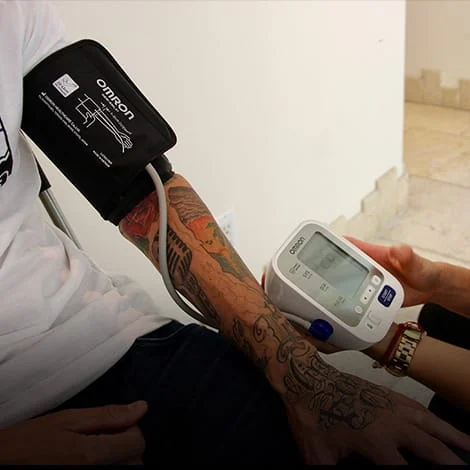
At Westwind Recovery®®’s drug rehab center, effective treatment for substance abuse begins with our clinicians getting a clear understanding of your specific situation and the help you need, all within the supportive environment of our holistic drug rehab Los Angeles program. While we don’t offer inpatient treatment, our treatment team will evaluate your medical health, mental health, and chemical use history to design individualized and specialized California addiction treatment programs for your recovery plan. These may include outpatient services or a PHP addiction treatment for those who need a higher level of care and structure while still living at home.
Addiction Rehabilitation Center
![]()
Because addiction is a disease that affects your body, mind, and spirit, we bring a multifaceted team together to provide you with a comprehensive healing plan. Your team members at the addiction rehabilitation center in Los Angeles may include:
- Physicians
- Psychologists
- Nutritionists
- Financial advocates
- Nurses
- Licensed marriage and family therapists
- Wellness and fitness specialists
- Clinical case managers
- Psychiatrists
- Licensed addiction counselors
- Continuing care coordinators
How to Choose an Inpatient Drug Rehab

One of the first steps in choosing an inpatient drug rehab in Los Angeles is determining what your needs and goals are. The first official step will be deciding which behavior (s) or substance (s) you would like freedom from. After that step, it’ll be best to determine if there are any other underlying issues such as medical conditions or dual diagnoses that you would like to have treated simultaneously.
Once you determine your goals, the next step would be to consult with a treatment provider after you have found a facility that matches closely with those same goals. Since there are various options available to choose from, it’ll be challenging without the aid of a treatment provider to decide. They are extremely knowledgeable about several aspects of rehab.
After you have gone over the rehab options, it would be ideal to do some research on them. Whether this is by way of a website or by giving them a call, understanding your options is crucial. As you are searching for the most suitable inpatient drug rehab in Los Angeles, or exploring luxury rehab centers Los Angeles offers, look further into the following areas:
- Therapies and treatments
- Length of the program
- Specialties
- Amenities
- Location
What Happens at an Inpatient Drug Rehab Center?

Following detox, you will move to your residential treatment unit at the inpatient drug rehab center in Los Angeles. This is where you’ll meet your treatment team and peers. At Westwind Recovery®® treatment centers, addiction rehabilitation center activities may include:
- Group Therapy
- Individual chemical health assessments and therapy
- Individual mental health assessments and therapy
- Medical appointments including psychiatric care
- Wellness and fitness activities including yoga, hikes
- Team-building outings
- Life skill training
- Creative arts groups including improv, music for coping, and art therapy
- Family program participation
- Virtual reality meditation sessions
- Nutritional assessment
- Spiritual care
- Educational and experiential workshops
- Twelve Step and recovery meetings
- Continuing care planning
Our drug and alcohol addiction treatment programs are evidence-based and also individually curated for each client. Westwind Recovery®® pioneered the field’s leading approach to addiction treatment, and we continue to evolve and advance the use of evidence-based treatments to provide our clients with the best opportunity for lifelong recovery from substance use disorder.
Some of the evidence-based treatments our clinicians use at the addiction rehabilitation center include:
- Acceptance commitment therapy
- Cognitive-behavioral therapy
- Dialectical behavior therapy
- Interpersonal therapy
- Medication-assisted therapies
- Mindfulness-based cognitive therapy
- Motivational interviewing
- Psychoeducational groups
- Psychodynamic approaches
- Solution-focused brief therapy or solution-focused therapy
- 12 step facilitation
- Virtual reality meditation
The addiction rehab center in Los Angeles focuses on stabilization and assessment of your health to ensure you are ready–physically, psychologically, and emotionally–to learn about core recovery concepts and to begin practicing recovery principles.
The structure and guidance provided in our rehab program will set you up for success in recovery and maintaining sobriety after you complete treatment. Here are some of the unique benefits available to you if you attend our rehab treatment program:
- A structured setting complete with on and off-site activities with those in the recovery community to help you build a network of clean and sober allies while you are in treatment.
- A progressive and personalized program to allow you to grow and progress while you are in treatment.
- A comprehensive aftercare plan so you know what your goals are, where you need to be, and how you can remain successful in your recovery.
Personalized Care
Because of our low client-to-therapist ratios, we provide incredibly personalized care that can grow and change as you grow and change. From the first day of treatment through the last, our staff of experts in the field of addiction is continually monitoring clients and assessing recovery needs. We understand that having an individualized recovery program that works for you is vital to lifelong recovery.
What Are the Benefits of Inpatient Drug Rehab?
In comparison to outpatient rehab, inpatient drug rehab in Los Angeles presents various benefits, including a higher success rate and safety.
Inpatient Detoxification
One of the main benefits of inpatient drug rehab in Los Angeles is that a safe place to detox is provided where the medical professionals can monitor the vitals and ease some of the uncomfortable symptoms.
Depending on the severity of the addiction and the substance, withdrawal symptoms typically start a couple of hours after the last dose of the drug. Generally, alcohol detox ranges anywhere from 3 to 10 days, with the withdrawal symptoms beginning within 6 hours and worsening at about 72 hours.
Reports have suggested that some withdrawal symptoms can last for a month, and sometimes depression and anxiety symptoms can persist for months. The advantage of being at an inpatient rehab facility means that clients have continuous access to help for withdrawal symptoms. Furthermore, the patients can be provided with medications to ease the detox.
Community
One of the major components of substance abuse treatment is the strong fellowship that is created amongst the counselors, individuals in recovery, and the staff. For that reason, programs such as the 12-Step have great success. When an individual has a solid support system of like-minded individuals who understand the struggles of addiction, and they have a shoulder to lean on, it’s extremely beneficial.
It’s not impossible to recover from substance use without the support of a community, but it is harder. As stated by The Substance Abuse and Mental Health Services Administration (SAMHSA), having social relationships and networks that provide hope, friendship, support, and love, is a vital part of recovery. Therefore, living in an inpatient drug rehab in Los Angeles will surround individuals with the needed social resources 24/7.
In outpatient rehab, it’s more difficult to form these types of bonds. Treatment facilities also excel in providing resources that are meant to help a person transition into normal life, such as creating an aftercare plan that could include sober living homes. It’s possible that individuals recovering might also receive guidance on pursuing employment as they complete treatment.
Success Rate
The main benefit of inpatient drug rehab in Los Angeles is that patients do not have access to their drug or substance of choice. Even though they have the freedom to depart from treatment at any given time, it’s less likely that they will return if they leave rehab and relapse. Studies have shown that inpatients complete detox more compared to individuals in outpatient rehab.
When individuals attend and remain in treatment, they have increased psychological, social, and occupational functioning, as well as decreased criminal activity. As individuals overcome substance use disorders (SUDs), they learn the tools to prevent relapse. Furthermore, they might be at more of a decreased risk of developing another substance use disorder.
According to a study that was published in Jama, “As compared with those who do not recover from a SUD, people who recover have less than half the risk of developing a new SUD. Contrary to clinical lore, achieving remission does not typically lead to drug substitution, but rather is associated with a lower risk of new SUD onset.”
How Long Is Inpatient Alcohol Rehab?

Your length of stay at an inpatient drug rehab center will be based on your progress in meeting specific clinical milestones. The clinical team will work with you and your family as well as your insurance provider to come up with the best timetable and plan for you. Just as addiction doesn’t happen in the course of a few weeks or months, it’s unrealistic to expect recovery to occur that quickly.
As you are discharged from treatment, you will receive recommendations for follow-up care and ongoing recovery support to strengthen your sobriety and reduce the risk of relapse. Regaining your health means learning to manage your symptoms, first within the structure at an inpatient drug rehab center, and eventually in your home environment where you are in charge of maintaining and strengthening your recovery.
How Much Does Inpatient Addiction Treatment Cost?
The cost of inpatient drug rehab center programs depends on the treatment center selected, the level of clinical care recommended, and the length of time in treatment. The amount you pay will also depend on whether you’re able to access insurance benefits to help cover the cost or you’re paying out-of-pocket.
Insurance policies and benefits vary greatly, so it’s essential to check with your provider about coverage specifics in your case.
Insurance Coverages for Inpatient Drug Rehab
Several health insurance plans cover outpatient dual diagnosis treatment, and inpatient rehab in Los Angeles, for the treatment of various substance use disorders. However, the policies and even individual plans will differ depending on the level of coverage that is provided for rehab. Therefore, it can be difficult to navigate the exclusions, coverage, and whether a certain treatment program is being considered will accept payments through insurance.
Fortunately, the majority of rehab centers utilize specialists to assist potential clients to understand the specifics of the policies. In addition, individuals who are seeking addiction treatment can contact their insurance provider directly to determine the specifics of coverage. For those seeking care at a reputable dual diagnosis treatment center in California, verifying insurance in advance can ensure a smooth admission process and help avoid unexpected costs.
Inpatient Drug Rehab in Los Angeles
Call us today to discuss individual addiction treatment programs and options. Contact Westwind Recovery®® to find the care, comfort, and support you or a loved one needs for addiction recovery. Your sobriety awaits.

Dr. Deena is the Chief Clinical Officer of Westwind Recovery®, an award-winning outpatient treatment center in Los Angeles where she oversees the clinical and administrative program and treatment methods. Dr. Deena is a doctor of psychology and licensed clinical social worker since 1993. LCSW #20628. Originally from the East Coast, Dr. Deena has worked running treatment centers, worked as a therapist in psychiatric hospitals as well as school settings and currently has a thriving private practice in the LA area. Dr. Deena has appeared regularly on the Dr. Phil Show as an expert since 2003. She has also been featured on many other TV shows, podcasts and has contributed to written publications as well as podcasts.




